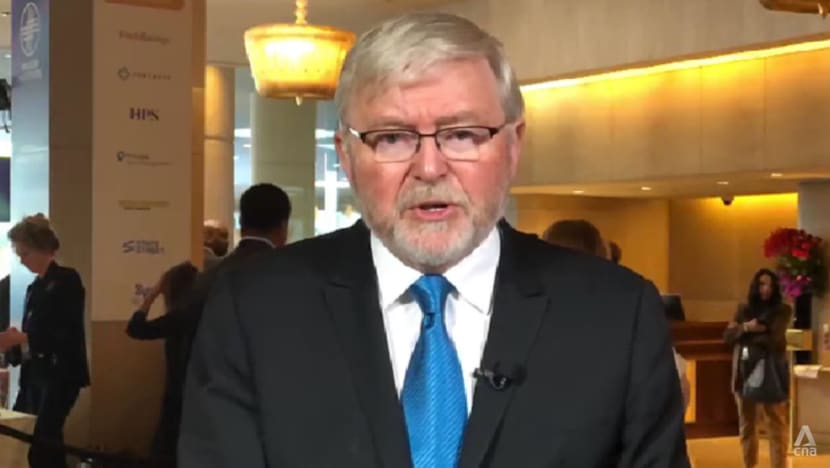China-West views of each other often lost in translation: Australian Ambassador to US Kevin Rudd
In an interview with CNA's Otelli Edwards, Mr Rudd spoke about the AUKUS trilateral security partnership, a shift in China's ideological perspective, and navigating the delicate balance of ties in the Indo-Pacific region.

Australian Ambassador to the United States Kevin Rudd speaking to CNA on the sidelines of the Milken Institute Global Conference in Los Angeles on May 7, 2024.

This audio is generated by an AI tool.
China and the West often have views of each other that are lost in translation or derived from misconceptions, said Australian Ambassador to the United States Kevin Rudd.
The former Australian prime minister stressed the need for all parties to have a “more refined and calibrated view of reality on both sides of this divide”.
“China often says we're currently in an age of the rise of the East and the decline of the West, which is code language for the US losing power militarily, economically, technologically, etc. It's an entrenched Chinese misperception … and most of us don't regard that as an empirical observation,” he said on Tuesday (May 7).
“In the US and the West, there is a view that China has a single view of the world. But if we know anything about Chinese elite politics, we know that there is a range of different views within China, including on the appropriate direction for China's future economic development.”
Mr Rudd was speaking to CNA on the sidelines of the Milken Institute Global Conference in Los Angeles, where business leaders gathered to discuss critical issues ranging from geopolitical tensions to the complexities of artificial intelligence.
During the wide-ranging interview, he spoke about the AUKUS trilateral security partnership, a shift in China's ideological perspective, and navigating the delicate balance of ties in the Indo-Pacific region.
ON AUKUS
Mr Rudd said the three-way AUKUS agreement between Australia, the United Kingdom and the US is necessary on the back of significant Chinese military expansion.
“AUKUS is not a defence security treaty. It is a collaborative arrangement for sharing and developing common defence platforms, weapons systems, and technologies,” he said.
Under the pact, the UK and US will help Australia acquire nuclear-powered submarines, and create an increasingly seamless collaboration for defence science and industry among the three nations, which in future could also involve other allies.
China has been boosting its defence spending in recent years, with its military budget more than doubling since 2015, in spite of slower economic growth.
The Chinese naval fleet, already the largest in the world, is expected to grow to 400 ships by next year.
ON CHINA
Mr Rudd told CNA that China under its President Xi Jinping has seen a notable shift in ideological perspective, influencing its behaviour domestically and internationally. More emphasis is now put on the Chinese Communist Party over the state and the individual.
“Under Xi, we see the rise of Chinese nationalism, in support of a much more assertive approach in Chinese foreign security policy,” he said.
“We see China's continuing efforts to assert its military and territorial interests in the immediate region, not just in terms of Taiwan, the East China Sea and the South China Sea, but recently and most curiously, in terms of an Australian operation,” he said.
Mr Rudd was referring to an incident in the Yellow Sea earlier this week, when a Chinese fighter jet dropped flares in front of an Australian seahawk helicopter.
Australia protested the move as an act of endangerment to its defence personnel during a United Nations operation to enforce sanctions in international waters against North Korea.
Beijing first retorted that it had to warn off the “provocative” Australian aircraft that deliberately flew near China’s airspace, before changing tune and accusing Canberra of spying on Chinese military exercise in the area.
ON INDO-PACIFIC
Mr Rudd said geopolitical tension, referring specifically to China, has pushed many nations in the Indo-Pacific region to ramp up their defence budgets.
“We're all preoccupied with the central change factor in the overall strategic stability of the region, which is China's increased military outlays and its increasingly assertive pattern of military behaviours,” he said.
He added that Indo-Pacific leaders are concerned over maintaining an appropriate military balance to sufficiently deter possibilities of hostile military action in the region, such as against Taiwan or in the South and East China Sea.
“How do we sustain the peace by sustaining deterrence and strategic equilibrium across the Indo-Pacific? That, I think, is what occupies most leaders across the region as we face these unprecedented challenges,” said the Mandarin-speaking Mr Rudd, who was also Australia’s foreign minister between 2010 and 2012.

















